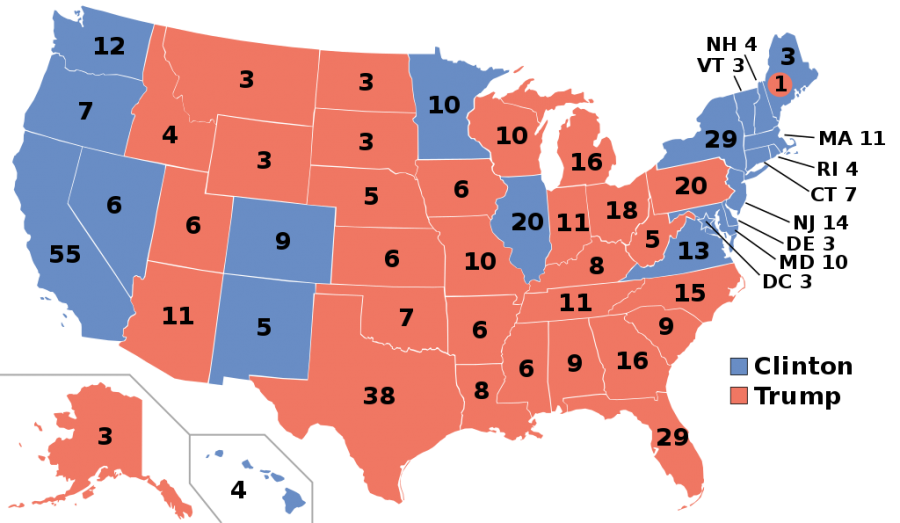An argument against the Electoral College
The electoral college map from the 2016 election.
Since the end of the 2016 election there has been a lot of backlash against the Electoral College; for the third time in U.S. history, the candidate who won the popular vote lost the election. Now, it is understandable to think that because the Electoral College has been in place since the conception of our country, it is a system that we must keep. However, this system, if we are to keep it, must be majorly reformed as it is a great threat to the democratic values on which the United States is supposed to be based on.
The Electoral College, as it stands now, is an outdated and inefficient system which does not allow for the amount of representation necessary for a country claiming to be operating as a democracy, even a republican one. The number of electoral votes per state, and the amount of electoral votes in total, needs to be greatly reformed.
The current number of electoral votes per state has created a large discrepancy in the worth of each vote of each citizen depending on the state of which he/she resides. For example, the least populous state in the union, Wyoming, has 584,153 citizens and three votes in the Electoral College. This means that each individual citizen’s vote accounts for .00000514881 Electoral College votes. In California, the most populous state, there is a population of 38.8 million people and 55 Electoral College votes. This gives each citizen of California .00000141752 electoral college votes.
This means that a citizen of Wyoming’s vote is worth 3.63 times more than a voter in California according to our current system of electorate votes. This needs to be reformed in order to allow for a more equal distribution of power per vote of every citizen.
While a change in the Electoral College would mark a paradigm shift in how elections in America are conducted, this wouldn’t be a bad thing. The strategy used by the candidates would be completely altered, and instead of focusing purely on electorate votes by playing the system, they would focus on something much more important: people.
While the opinions of people in less populous states would not be held in as high regard as those in states with higher populations, this is not a bad thing due to pure numbers. Why do voters’ opinions matter more if they are surrounded by less people? All candidates, no matter their political affiliation, should have to pander more to the sensibilities of rural residing Americans, not just Republicans.
Hillary Clinton would have focused more attention on the concerns of states like Oklahoma if she thought there was any chance of her securing votes that actually counted toward her in the end, regardless of how the people around them voted. The same can be said of Donald Trump with states like New York or Illinois. There are plenty of rural inhabitants in southern Illinois, as well as urban ones in the north. Democrats in Oklahoma and Republicans in New York alike would no longer feel like they are stripped of a voice in the general election, and the candidates would begin to lessen their ideological gap in an attempt to appeal to more Americans, not just the ones they think matter.
Another major issue with the Electoral College is the system of voting we have in which there can only be two major candidates. This is responsible for forcing the two party system that our country has found itself in for generations. This is because the two major candidates are often voted for out of fear of the other rather than out of their own support. If anyone else decides to run under similar principles of one candidate, oftentimes, all that happens is the vote of that ideology is split between the two candidates, giving the election to the opposing candidate. This may seem unavoidable, however, there are very simple solutions to this, such as implementing a system of preferential (or ranked) voting.
All of this being said, there are some who are calling for the electorates in the most recent election to cast their votes for Hillary Clinton in the spirit of Democracy. This is dangerous and frankly immature. Yes, Hillary Clinton won the popular vote and she lost the election as a whole, but if we are to change the system to make it more representative we must do it moving forward. President-elect Donald Trump won fair and square under the current system that we have in place, as absurd as it may be. Just because your ideal candidate has lost the way she did, does not mean we should undermine the system that we currently operate under.

Zach Wols is a senior who is an A&E Editor. He loves to hang out with friends and play guitar. He hopes to major in journalism when he gets out of...








